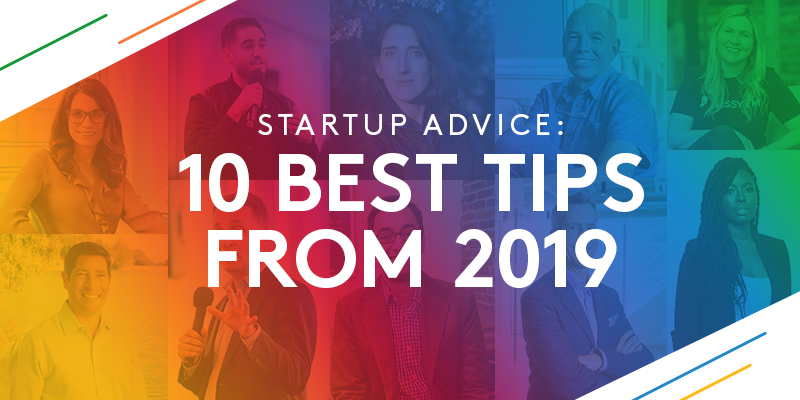
In 2019, LIFT Labs hosted a wide variety of experts and entrepreneurs. From leaders in venture capital to successful startup founders and best-selling authors, we’ve heard from some of the greatest minds in entrepreneurship.
Ready to use their insight to take your business to the next level? Here are the top tips we learned in 2019.
1. When you need a break, take one
“There’s a pervasive message in the entrepreneurial community that tells people to wake up at 4 a.m., take no days off, never stop hustling, fail fast and often, and that rest is for suckers. You know what I have to say to that? Take a nap! Learning from your failures is great in the long run, but in the short term, failures hurt. Add sleep deprivation and financial constraint on top of that and you’re headed for disaster.”
–Alex Banayan, best-selling author of The Third Door
2. Test, test and test again.
“Really smart early-stage leaders not only have great ideas, they are clever about figuring out ways to test ideas quickly, cheaply and easily. They know how to fake it and hack it. That helps you learn fast.”
–Marc Randolph, co-founder and first CEO of Netflix
3. Sell aspirin not vitamins.
If you’re driving to work but forgot to take a multivitamin, you won’t turn your car around and go back. If you’ve got a raging headache and forgot to take an aspirin, you’ll definitely go back. “It’s a good way to think about the products and solutions you’re offering to the market. Are they so compelling and providing so much value that customers will obviously pay for them? If you’ve got an aspirin – a must-have – you’re likely to overcome the initial inertia of getting customers or businesses to switch to your product.”
–Scott Kupor, Managing Partner at Andreessen Horowitz
4. It’s never been a better time to start a podcast.
“Everybody I know wants to write a book and nobody ever says, ‘but there are so many books out there already.’ The number of podcasts that exist will only grow, and I guarantee that if you do not start your podcast this year, you’ll regret it in five years.”
–Molly Beck, CEO of podcast production platform Messy.fm.
5. To break in with a large corporation, find an internal champion.
“You’ve got to find a champion inside the organization, somebody who really resonates with what you’re trying to accomplish, with your culture, with the objectives you targeting — and then use that champion as a wedge in and somebody who can consistently help you get over the bumps and weather the storms.”
–Sam Schwartz, Chief Business Development Officer at Comcast
6. Get your company values “off the walls and into the halls.”
Whether your company values have stood for 100 years or they’re brand new, living your values everyday sets great workplaces apart. “Know your values — get them off the walls and into the halls. You can’t just have your values on a plaque on the wall. They have to come alive and be meaningful.”
–Erica Keswin, author of Bring Your Human to Work
7. Remember, small steps lead to your grand vision.
“By necessity, founders are thinking about the end state of their vision, but understanding what steps are going to get you to that vision are important. From identifying the initial milestones, to approaching their go-to-market strategy with the right perspective, all the way to the potential their technology might have inside a larger organization, connecting all those dots is crucial.”
–Matt Zelesko, Chief Technology Officer at Comcast
8. Set your sights on the right goals.
Founders need to focus their energy on what truly makes them happy, rather than getting caught up in today’s social media culture. “With the content we consume, so much of our identity is tied to how much money we make or how much we look like we make … but you didn’t come out of the womb wanting Louboutin shoes or needing to build a multi-million dollar enterprise.”
–Erica Williams Simon, consultant and author of You Deserve the Truth
9. The investor/founder relationship should be collaborative, not adversarial.
“There was this perception that you and your investors are on opposite sides of the table, that you have to package your information and put a spin on it with your investors. I’ve come to realize that’s just wasted energy. If you cannot have an objective, real conversation with your investors, you have the wrong investors.”
–Apu Gupta, CEO of Curalate
10. Spend time on distribution, not just content creation.
You should be spending the same amount of time on distributing content as you do creating it. “If it took an hour to write a post, then spend an hour looking for channels, rewording things and trying to get that content into different people’s hands. We tend to think if we make wonderful content people will come, but no, you have to spend the same amount of time getting that content to where people are.”
–Kelly Moffitt, producer at StoryCorps and contributor to NPR’s Morning Edition
To read more inspiring startup stories and to stay connected to Comcast NBCUniversal LIFT Labs, sign up for our newsletter and follow us on Twitter.
